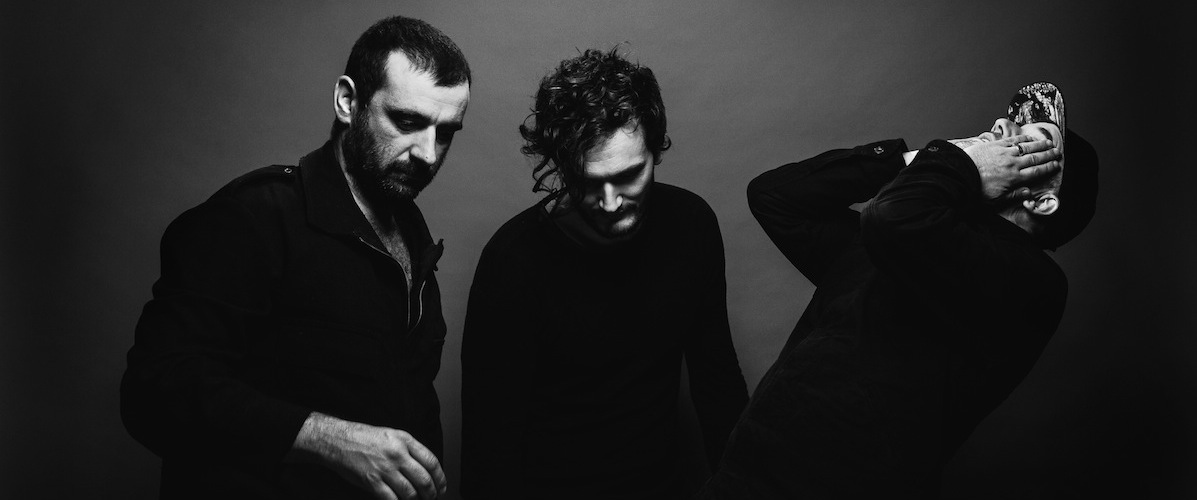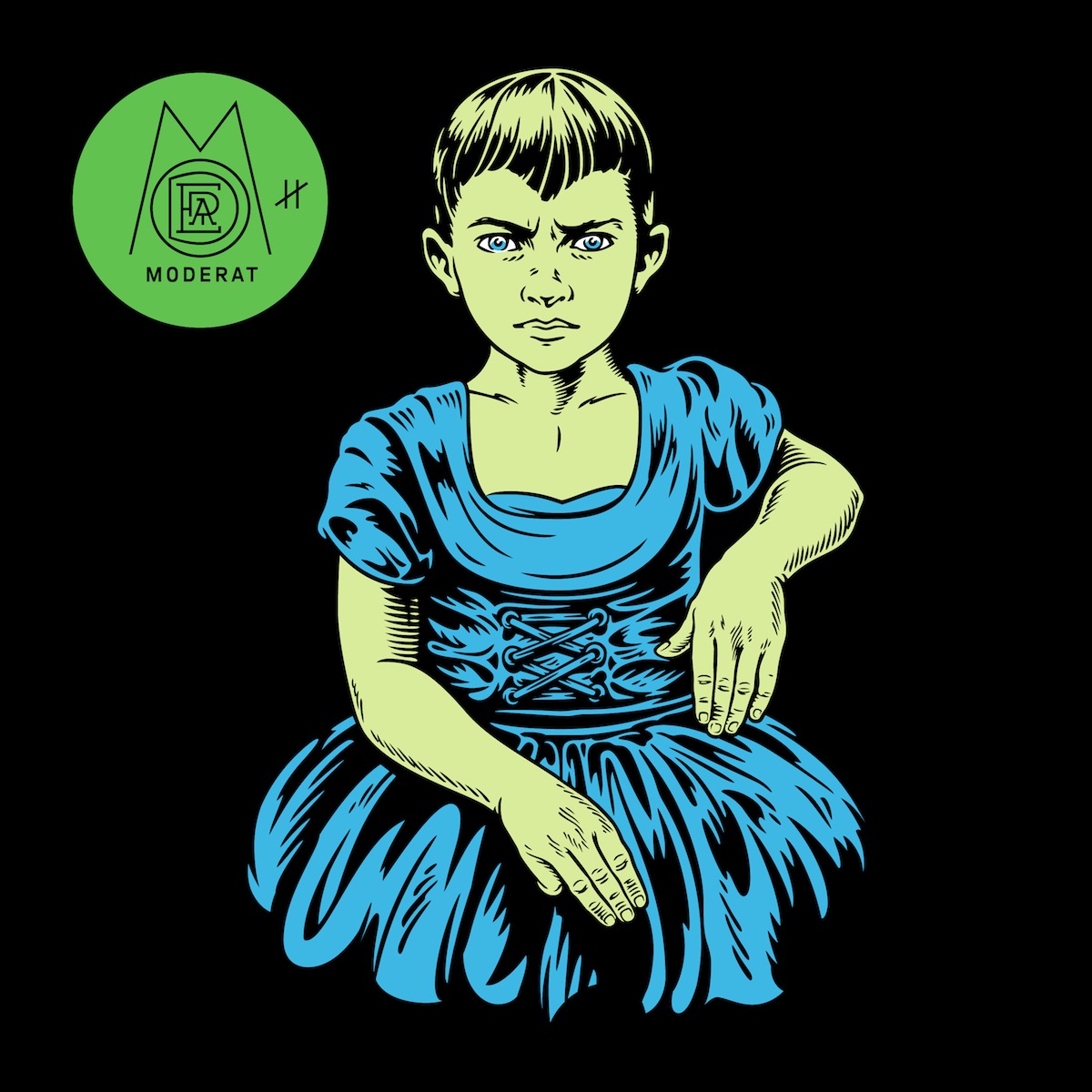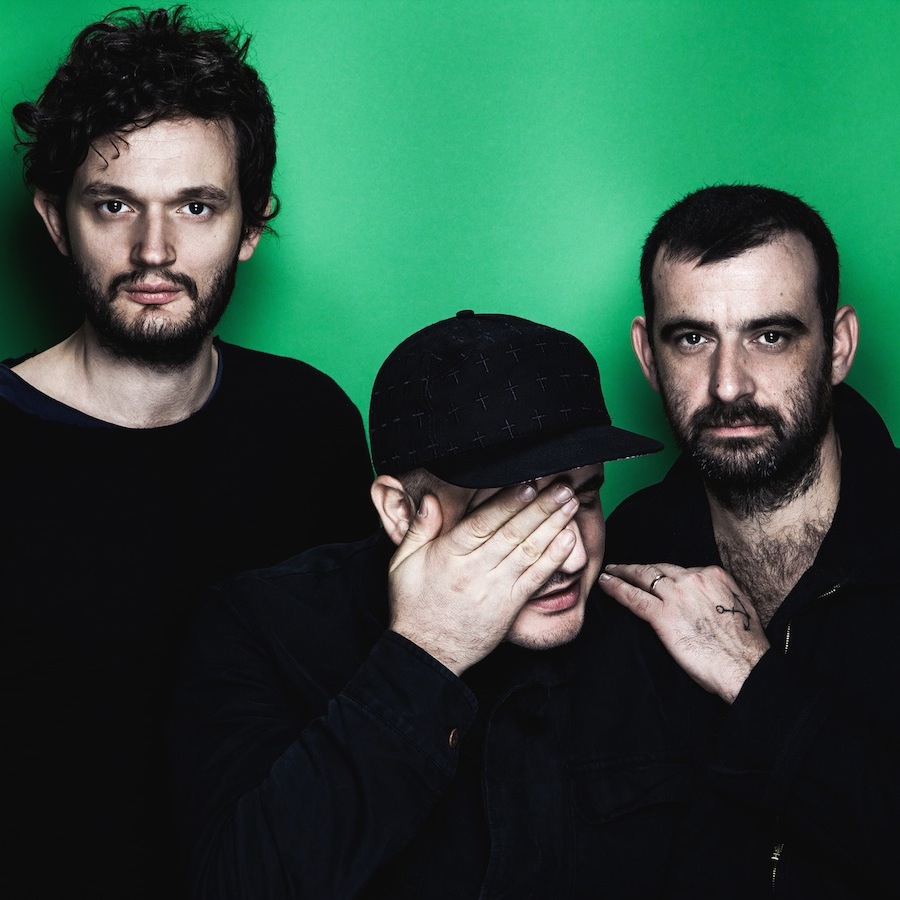Moderat: Power of Three
They may be up to album number three, but Sebastian Szary, Sascha Ring and Gernot Bronsert's sonic synthesis doesn't come easy.

Moderat: Power of Three
They may be up to album number three, but Sebastian Szary, Sascha Ring and Gernot Bronsert's sonic synthesis doesn't come easy.

Disregarding the rare savant who can toss off a masterpiece in an afternoon, art rarely comes easily. Self-doubt is always there; the pressures of the outside world are always present; motivation, or lack thereof, is always a factor. That’s true of one artist—with three individuals working in concert, those stresses rise exponentially. Of course, you’d be forgiven for believing that none of this applies to Moderat, the ongoing union of Gernot Bronsert and Sebastian Szary from Modeselektor and Sascha “Apparat” Ring, the one-time co-owner of the much-missed Shitkatapult label. After all, their music—beginning with their eponymous debut LP on Ellen Allien‘s BPitch Control, through 2013’s II , through to the new, equally succinctly-named III—seems like a natural, flowing, almost effortless result of the team member’s various strengths, fusing Modeselektor’s crunchy, giddy, punch-drunk percussion to Apparat’s diaphanous ethereality to form a kind of grand dreamtime pop that’s both intimately down-to-earth and grandly otherworldly. (The trio’s 2003 debut, the experimentally-minded Auf Kosten Der Gesundheit EP, is something of an outlier in the Moderat discography).
III isn’t a radical departure from the Moderat sound; instead, it’s a refinement of the template, graced by soaring, undulating melodies (often featuring Ring on vocals), unexpected textures and rhythms, and perhaps most of all, a songcraft that goes beyond anything that Bronsert, Szary and Ring have offered before. But even though the music comes off as an organic synthesis of the threesome’s styles, the new album—like the others—didn’t come as easily as one might think, with the Moderat website stating that the album is “made of blood, sweat and tears.” XLR8R recently caught up with the three friends, who will be embarking on an extensive live tour throughout Europe and North America starting on April 1, to find out more.

What was the genesis of Moderat? How did Modeselektor and Apparat originally hook up?
Bronsert: We originally met Sascha, I think in 2002, through Gudrun Gut and Thomas Fehlmann, who were trying to do a festival where the independent record labels would come together and do a showcase. We were there for BPitch Control, and Sascha was there for Shitkatapult, which were kind of the two cool labels in Berlin at the time. We were kind of the oddballs in the techno flood that was surrounding us—Modeselektor wasn’t a very techno label, and neither was Apparat.
Szary: We’re very different, musically—Sascha was more the quiet side, and we were more the loud side—but after we met, we realized that all three of us liked to swim against the stream. And so we decided to make music together. Sounds easy, yeah? [laughs]
Ring: It was never really our intention to do anything together; both Modeselektor and Apparat were already making music and doing okay. But we were there, everybody else was techno, and we weren’t—which gave us something in common.
You released an EP not so long after that, but even with that “we-are-not-techno” connection, it wasn’t till 2009 until the first Moderat album was released. Gernot, I interviewed you when that LP came out, and you said that “at one time I really hated this album. When you have little babies at home, as Sebastian and I both have, things become much more difficult. It cost me a lot of time and health and stress with my wife.”
Szary: It still does! It’s always the same! Except that there are no little babies any more.
Bronsert: Writing music is always a difficult process. That’s something that’s never changed for us. Actually, the older we get, the more complicated the writing process becomes.
Ring: Complicated in a different way, I would say. One big problem is that when you older, there are lots of ideas that you’ve already followed and a lot of things you’ve already done. It gets harder to find new things that you like and that you want to try out. I think that’s true for all three of us. And when we start to make a record, we need an idea that will be interesting for all three of us, and it becomes harder and harder to find that common ground.
How does the Moderat songwriting process work? Are you all together in a room, banging out a track?
Ring: Not really in the beginning. We’ll have a few weeks where everybody is trying to come up with as many song ideas on their own as possible.
Bronsert: The studio has three rooms, so each of us is sitting in their own room.
Ring: Then, there are discussions involved. There are lots of discussions about hi-hats or whatever. [laughs] For the second album, Gernot’s wish was that we all be in the studio at the same time, all the time, working on music together. It proved to be a little tough, but I think it changed the sound of the record. And now, for the new one, we tried something like that concept—but it’s not always possible. I don’t think you can make a record the same way each time—you always need a new plan, and even if you don’t, it ends up being different anyway. This time, we kind of broke off into smaller groups; sometimes Gernot would be with me, or sometimes Szary would be with me working in some modular fashion, or they would be working together doing whatever.
“Moderat isn’t really the combination of Modeselektor and Apparat—it’s the combination of Gernot, Szary and Sascha.”
Szary: When you are working on a song, sometimes you know if there is something missing, just some little part or element. You realize, okay, I need to fix that. So you go alone into another room, or with one of the others, give it a few hours—and maybe something happens. And while you are doing that, maybe the others are working on another song.
I’m certainly not the first to note this, but Moderat seems to slot somewhere in the middle of the Modeselektor and Apparat sounds. Do you feel there is there a tension between your individual sounds, and is resolving that tension part of what makes Moderat work?
Ring: Yes, absolutely, but it’s not always as simple as you describe. Very often, there will be some crazy beat on a song—a Modeselektor kind of beat—but its quite possible that Gernot or Szary was not the one to make that beat. One of the reasons we have this project is to be able to get out of our personal sounds. It could be that it was me who made that big fat beat…or it could be that Gernot was responsible for some very beautiful melody. Moderat is really like a playground, one where we are allowed to try new things. That’s really why we started making albums in the first place: We were a little bit tired of doing what we were doing, and we wanted to have something else. So I would say that Moderat isn’t really the combination of Modeselektor and Apparat—it’s the combination of Gernot, Szary and Sascha.

When the first LP came out, I suspect a lot of people thought that would be all for Moderat, that this was a one-album project.
Szary: Yes, us too!
When did you decide that this was going to be an ongoing affair?
Ring: I think it was when we were on tour for that first album. It was so much fun, and it was so cool for us to be playing in concert venues, and not just playing in clubs at three o’clock in the morning all the time. We liked the whole tour experience, being on a bus and all that, and we liked having a very attentive crowd that was not only there to get wasted. I mean, we like that—we like to get wasted, too—but I think that experience is what convinced us to make a second record. The idea was that we would do another album in around three years, and we do our own records in between. But this turned out to be more complicated than we thought, because it was really hard to go back to our separate projects. We found out that we were missing each others opinions. We all struggled. But for the third record, we were all like, “Fuck it, let’s just go with the flow and make another Moderat album right away.”
On all three albums, but particularly this last one, the music has this interesting feel of being luxuriously spacious and sweeping, yet still grounded and intimate in nature. Is that something you strive to achieve?
Ring: You know, I think it’s hard for us to tell anymore; when you hear the music a lot, you kind of lose some perspective. But I think what we always try for is a cinematic effect—a wide spectrum of sound that you can dive into. We don’t want to make the music sound like there is too much pathos—we know we are always on the edge of that anyway, and we try to avoid that. We are always throwing away half of the effects in each song to try and keep them from being oversized. But I guess we do like that bigness.
“In the end, we’re just three guys who know how to use machines and a computer to make music.”
And where does the personal part come from?
Ring: I think that comes from the vocals.
Are the lyrics and vocals yours, Sascha?
Ring: Yeah, and I think that’s probably where the counterpart to the bigness comes in.
Is Moderat making pop music? Or are you aiming for something beyond that?
Bronsert: We are not really big fans of genres.
Ring. For me, it is a pop record.
Bronsert: Well, maybe for you it is! [laughs]
Ring: You don’t think it is our version of pop?
Bronsert: I don’t know. For me, it’s just the music that appears. There was no planning behind exactly what Moderat would be. We were always sure about what did not want to do, but we weren’t so sure about what we would actually do. There was no Plan B. There was never even a Plan A. We were just making music, protecting each other and giving each other as much trust as possible. It’s not just like sitting down and writing a song—sometimes we get very philosophical and deep with each other. But in the end, we’re just three guys who know how to use machines and a computer to make music.
Szary: But we are not saving anyone’s life.
Well, you never know.
Brosort: Yes, maybe we do save lives. One of the reasons we keep doing Moderat is that the power we have together, as friends and as a band, can have an impact that’s way more than the impact that we have with our solo projects. We are not able to create this kind of energy with Apparat along or with Modeselektor alone. I think the fusion of the two camps—the music we like, the people we hang out with—it all clashes, and that clash is what Moderat is. For me, the nicest moment was when we finished making this fucking record, which took a year of our lives and a lot of energy and pain…but there’s the moment when it comes out that makes me so happy. I’m finally able to share more of this beautiful world that we made.
It’s been reported that III marks the end of a trilogy. Does that mean that this is the end for Moderat?
Ring. It means we have the option to stop now. We have an exit. And if people ask, we can just say, “Well, it was the end of the trilogy.” Isn’t that convenient? [laughs] But really, we don’t know—it depends how things are going.

Whatever the case, you still have a tour to get through. Your previous live dates have had a large visual component—with that be true of this tour as well?
Ring: Absolutely, though it will be different. It will be adjusted to fit with our current…mood, I guess, or the mood of the record. But we’re still not sure how it is going to look—we are just now in the middle of making the light show. And we’re rehearsing at the same time, so we are busy.
You said earlier that you enjoyed touring after the first album. Is that still the case, or are you jaded by now?
Ring: We absolutely love it. When the tour is starting, and you have a good feeling about your show, that’s a really nice moment. Really, one of the reasons to make this record is so that we could tour with some nice music! And now we’re gonna tour the shit out of it.
Bronsert: The funny thing is, he’s usually the first one who starts complaining.
All photos: Flavien Prioreau
Moderat III (Mute/Monkeytown) is out April 1.

